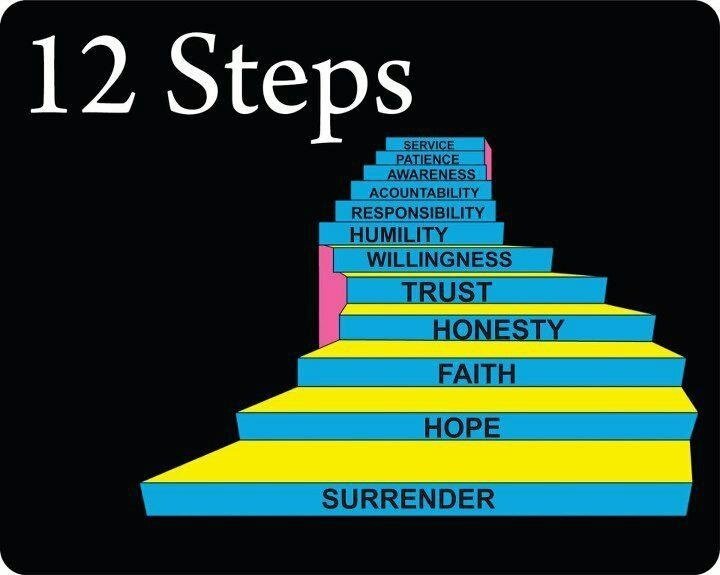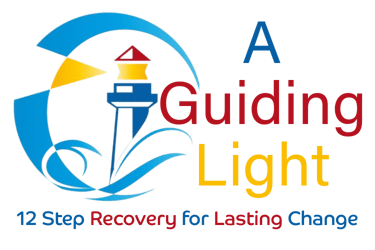The 12 Steps of Alcoholics Anonymous
A look at the twelve steps of AA and how we might approch them and what benefits we might encounter along the way.
AA
Dale P.
5/22/20247 min read


Alcoholics Anonymous
12 Steps
1. We admitted we were powerless over alcohol — that our lives had become unmanageable.
We need to acknowledge and accept that we had no control over our drug use and that it had reached a point where our lives had become unmanageable. This realization is crucial for us to begin our journey towards recovery. It is an admission of our powerlessness and an acknowledgement that alcohol has taken control over our lives. By accepting this, we can start seeking help, support, and guidance to regain control and create a healthier and more manageable life. Taking this step requires courage and honesty, but it is the first step towards a brighter future and a life free from the grip of alcohol addiction.
2. We came to believe that a Power greater than ourselves could restore us to sanity.
After going through a period of struggles and challenges, we started to realize that we needed something beyond our own capabilities to bring us back to a state of soundness and clarity. It dawned on us that there had to be a higher power that could help restore our mental well-being and bring back a sense of sanity into our lives. This realization opened our minds to the possibility of seeking help and guidance from a power greater than ourselves. It was through this acknowledgement that our journey towards recovery and healing truly began. We understood that we needed to surrender our egos and rely on this higher power to lead us on the path to sanity. This newfound belief gave us hope and strength to work towards restoring our mental equilibrium, knowing that we were not alone in our struggles.
3. Made a decision to turn our will and our lives over to the care of God as we understood Him.
After much contemplation and soul-searching, we have come to a profound realization. We have made a resolute decision, one that holds the power to transform our lives. With unwavering faith, we have chosen to surrender our will and our existence to the loving care of a higher power, whom we understand as God. This decision is not one made lightly, but rather with a deep sense of surrender and trust. By placing our lives in the hands of a divine force, we acknowledge that we are not in control of everything. We surrender our desires, fears, and insecurities, inviting God to guide us on our journey. This surrender is a profound act of humility and faith, allowing us to find solace and strength in the presence of a benevolent creator.
4. We made a searching and fearless moral inventory of ourselves.
We approach the fourth step with courage and determination. Acknowledging that we are not perfect, we fearlessly embark on a journey to explore our flaws and weaknesses, aware that this is an essential step towards personal growth. Additionally, we do not overlook our strengths and positive attributes. We make a conscious effort to identify and take note of our strong suits, recognizing that they contribute to our overall well-being and success. By embracing both our defects of character and our strong suits, we adopt a balanced perspective and foster a sense of self-awareness. This allows us to continually evolve and strive towards becoming the best version of ourselves.
5. We admitted to God, to ourselves, and to another human being the exact nature of our wrongs.
When taking the fifth step, we acknowledge and confess to God, ourselves, and a trusted person the precise details and true essence of our mistakes and wrongdoing. This process requires us to be honest, transparent, and humble as we examine our actions, motivations, and the consequences of our behavior. By admitting the exact nature of our wrongs, we take responsibility for our actions and begin the process of forgiving ourselves as well as others. This step is essential for personal growth, spiritual development, and healing. It allows us to confront our flaws, learn from our mistakes, and move forward on a path towards self-improvement and reconciliation. Through this process of admission and accountability, we strive to become more self-aware, compassionate, and loving human beings.
6. We were entirely ready to have God remove all these defects of character.
We were wholeheartedly open to the idea of a divine power guiding us towards the betterment of our character. With unwavering determination, we welcomed the opportunity for transformation without any doubts or hesitations. Believing in the presence of a higher power, we willingly surrendered ourselves to its guidance, seeking to enhance our virtues and overcome our flaws. It was an earnest desire to evolve, to become the best version of ourselves, and we placed our complete trust in God’s ability to lead us towards growth. With faith in our hearts and a yearning for self-improvement, we embarked on a journey of self-discovery and personal development, eagerly awaiting for a power greater than ourselves to remove all of our defects of character.
7. We humbly asked Him to remove our shortcomings.
In order to grow and improve ourselves, it is essential to acknowledge our flaws and seek divine intervention. It is humbling to realize that we are not perfect and that we have shortcomings that hinder our progress. Thus, we must approach God with humility and sincerely ask for His assistance in removing these weaknesses from our lives. By doing so, we demonstrate our willingness to change and become better versions of ourselves. This act of seeking divine help shows our recognition that we cannot overcome our flaws on our own and that we need the guidance and support from a higher power. Through this humble request, we open ourselves up to the possibility of transformation, allowing God to work within us to eradicate our shortcomings and enable us to lead more fulfilling and purposeful lives.
8. We made a list of all persons we had harmed, and became willing to make amends to them all.
During our journey of recovery, we took a crucial step by creating a comprehensive list of all the individuals we had caused harm to. This exercise allowed us to confront the consequences of our actions and take responsibility for the pain we may have inflicted upon others. By acknowledging our wrongdoings, we began to cultivate a deep sense of humility and empathy. It was not enough to simply recognize our mistakes; we had to be willing to make amends and seek forgiveness from those we had harmed. This process required strength and courage, as it meant facing the consequences of our actions head-on. However, by taking this important step, we opened the door to healing and reconciliation, both for ourselves and for those we had harmed.
9. We made direct amends to such people wherever possible, except when to do so would injure them or others.
In our journey towards personal growth and healing, we have learned the importance of making amends to those we have harmed. It is crucial for us to take responsibility for our actions and strive to repair the damage we have caused. Whenever possible, we have made direct amends to the individuals we have hurt, acknowledging the pain we have inflicted upon them. However, we also recognize that there are situations where making amends could potentially cause more harm, either to the person we have wronged or to others involved or to ourselves. In such cases, we exercise caution and refrain from taking actions that could lead to further injury. It is our sincere intention to make amends in a way that promotes healing and growth, while considering the well-being of all parties involved.
10. We continued to take personal inventory and when we were wrong promptly admitted it.
Taking personal inventory is an ongoing process that requires self-reflection and honesty. It involves examining our thoughts, actions, and behaviors, and acknowledging any mistakes or wrongdoings promptly. By doing so, we cultivate a sense of accountability and integrity. This practice helps us to grow and learn from our errors, fostering personal growth and development. Admitting when we are wrong is not always easy, as it requires humility and the willingness to take responsibility for our actions. However, by promptly admitting our faults, we demonstrate maturity and a commitment to self-improvement. This continuous inventory-taking allows us to maintain healthy relationships, make amends when necessary, and strive for a better version of ourselves. It is a powerful tool for personal transformation and maintaining a balanced and authentic life.
11. We sought through prayer and meditation to improve our conscious contact with God as we understood Him, praying only for knowledge of His will for us and the power to carry that out.
In our quest for spiritual growth, we embarked on a journey of prayer and meditation. Our aim was to enhance our connection with God, as we understood Him. We focused our prayers on seeking knowledge of His will for us and the strength to execute it. Through these practices, we aspired to deepen our conscious contact with a higher power, opening ourselves up to divine guidance and wisdom. This conscious effort to align our thoughts and actions with God's purpose allowed us to navigate life's challenges with clarity and confidence. We recognized that surrendering to His will and relying on His power would lead us towards a purposeful and fulfilling life. Through prayer and meditation, we found solace, inspiration, and the guidance needed to walk the path that God had laid out for us.
12. Having had a spiritual awakening as the result of these Steps, we tried to carry this message to alcoholics, and to practice these principles in all our affairs.
After experiencing a profound spiritual transformation as a direct outcome of taking the twelve steps, we made a conscious effort to share this message with others who struggle with drug addiction. Our aim was to extend a helping hand and offer support to fellow addicts who may be seeking a similar awakening. Moreover, we committed ourselves to embodying the principles we had learned in all aspects of our lives. It became our mission to ensure that these principles were integrated into our daily routines and interactions, guiding our behavior and decision-making processes. By doing so, we were able to maintain a sense of spiritual connection and continue our own personal growth while simultaneously aiding those who were still on the path to recovery.
Find Us On
Find us on Facebook, Instagram and YouTube & More
Contact Us
Subscribe to our Newsletter
Help@agl911.com
(559) 616-2719
© 2025. a guiding light 911 All rights reserved.
Books Available at
Paperback Books on Amazon and Coil Bound Books on Lulu
Info@agl911.com
Sales@agl911.com
Support@agl911.com
Disclaimer:
Al-Anon Family Group Headquarters, Inc. (AFG, Inc.) does not endorse and is not affiliated or in any way associated with A Guiding Light 911 or www.agl911.com website. The official AFG, Inc. website may be found here https://al-anon.org/. The AL-ANON name and logo are registered trademarks of AFG, Inc. All statements or opinions expressed are strictly those of the author and do not reflect those of AFG, Inc.
